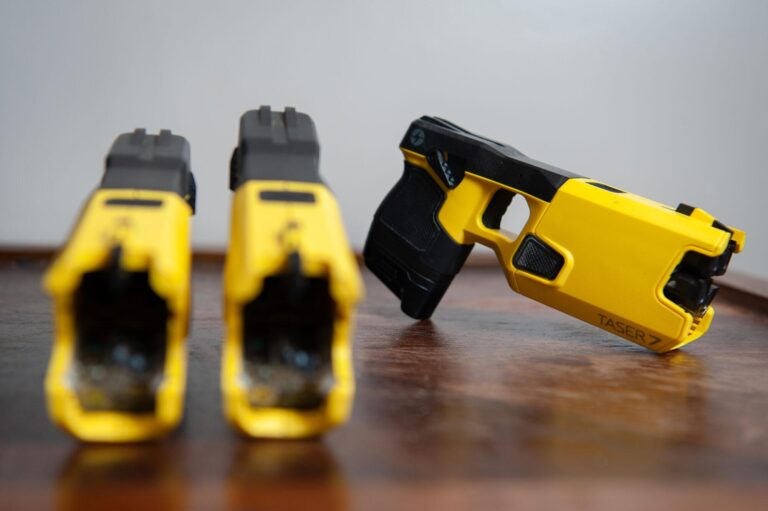Table of Contents
- Mississippi Legislature Approves Ban on Law Enforcement Stun Guns
- Human Rights Advocates Express Support Amid Controversy
- Impact Analysis on Police Tactics and Public Safety Strategies
- Recommendations for Alternative Non-Lethal Law Enforcement Tools
- Concluding Remarks
Mississippi Legislature Approves Ban on Law Enforcement Stun Guns
In a decisive move, Mississippi’s state legislature has passed legislation targeting the use of stun guns by law enforcement agencies, with a comprehensive ban set to take effect by mid-2025. This legislative action follows mounting concerns over the potential misuse and safety risks associated with electroshock weapons. The bill stipulates the prohibition of acquisition, deployment, and training involving stun guns, fundamentally altering operational protocols for local and state police departments.
Key aspects of the legislation include:
- Complete cessation of stun gun use across all law enforcement entities within Mississippi.
- Mandatory review and amendment of current use-of-force policies to exclude electroshock devices.
- Implementation deadline set for July 2025, allowing agencies time for compliance and transition.
- Emphasis on alternative non-lethal methods prioritized by state-approved training programs.
Human Rights Advocates Express Support Amid Controversy
Human rights organizations have rallied behind the Mississippi legislature’s decision to phase out stun guns for law enforcement by mid-2025, emphasizing the move as a crucial step toward aligning policing practices with human rights standards. Advocates argue that stun guns, while often considered non-lethal, pose significant risks of excessive force and potential abuse, disproportionately affecting marginalized communities. Several groups highlighted the importance of the ban in preventing unnecessary harm and promoting accountability within police departments.
Supporters have also called for concurrent investment in alternative, less harmful technologies and comprehensive training programs for officers aimed at de-escalation and conflict resolution. Key points raised by human rights advocates include:
- Ensuring transparency in law enforcement use-of-force policies
- Protecting vulnerable populations from disproportionate violence
- Encouraging community engagement to rebuild trust
- Advocating for ongoing oversight and evaluation of policing tools
By endorsing this legislation, human rights leaders hope Mississippi will set a precedent that balances public safety with the imperative to respect and uphold individual rights.
Impact Analysis on Police Tactics and Public Safety Strategies
The prohibition of stun guns in Mississippi is poised to necessitate a significant recalibration of existing law enforcement methodologies. Officers will need to enhance their proficiency in alternative restraint and de-escalation techniques, potentially leading to increased reliance on physical interventions or non-weaponized control tactics. This shift may prompt departments to intensify training programs focused on verbal communication, conflict resolution, and crisis intervention to mitigate situations without resorting to force. Furthermore, the ban could influence procurement policies, with agencies investing in advanced less-lethal tools approved under new legal frameworks.
Public safety strategies will also undergo transformation, as communities and policymakers grapple with balancing effective policing and individual rights. Key areas of change may include:
- Revision of use-of-force protocols to exclude stun guns while preserving officer and civilian safety.
- Enhanced collaboration between law enforcement and mental health services to address incidents involving vulnerable populations sensitively.
- Implementation of community outreach initiatives aimed at fostering transparency and trust amid evolving enforcement practices.
Recommendations for Alternative Non-Lethal Law Enforcement Tools
In light of the upcoming ban on stun guns in Mississippi, law enforcement agencies must explore a range of non-lethal alternatives that balance officer safety with community trust. Options such as expandable batons, pepper spray, and chemical irritants remain widely utilized for their ease of use and effectiveness in controlling volatile situations. Additionally, technological innovations like conducted electrical weapons with proven safety profiles and precision net launchers offer promising solutions that reduce the risk of fatal outcomes while maintaining operational control.
Beyond equipment, investments in de-escalation training programs are paramount, empowering officers to resolve conflicts without resorting to force. Incorporating tools like
- body-worn cameras for transparent interaction review
- mobile crisis intervention units staffed with mental health professionals
- advanced communication technologies to coordinate rapid backup
Concluding Remarks
As Mississippi moves forward with its plan to ban stun guns in law enforcement by mid-2025, the state joins a growing number of jurisdictions reevaluating the use of such devices amid concerns over safety and accountability. The decision is poised to prompt ongoing discussions about alternative methods for ensuring public and officer safety without compromising ethical standards. Stakeholders and residents alike will be watching closely as the implementation of this policy takes shape in the coming months.Check Our Other Blogs
- StunGun – Your Trusted Source for Stun Guns, Laws, and Self-Defense Tips
- PepperSprayLaws – Your Trusted Resource for Pepper Spray Information
- StunGunLaws – Your Trusted Guide to Stun Gun Legality and Safety





